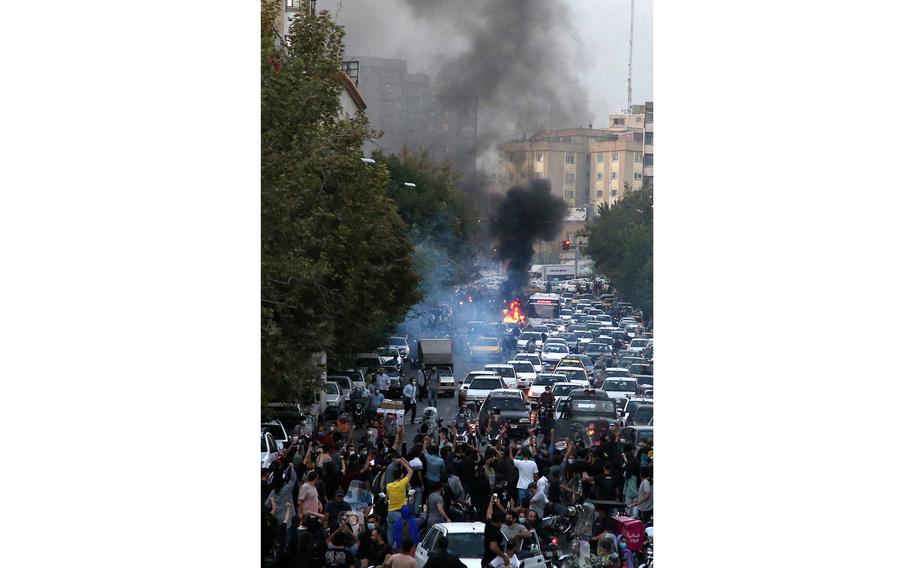
A picture obtained by AFP outside Iran on Sept. 21, 2022, shows Iranian demonstrators taking to the streets of the capital Tehran during a protest for Mahsa Amini, days after she died in police custody. (AFP, Getty Images/TNS)
Iran (once known as Persia) is one of the oldest civilizations. Its roots date back some 4,000 years. Iran was unified as a nation in A.D. 625. Soon afterward, under Cyrus and Darius, it emerged as the world’s first global superpower. Iran has produced many great poets, writers and scientists whose works have inspired people throughout the world. In college I learned to appreciate the love poems of Rumi and the Rubaiyat of Omar Khayyam.
Today, two of the most imaginative and renowned theoretical particle physicists are Iranian or of Iranian heritage: Cumrun Vafa of Harvard University and Nima Arkani-Hamed of the Institute for Advanced Study. I am proud to have them both as friends and colleagues.
For the past four decades, Iranians have suffered a repressive theocratic dictatorship that stifles their freedom, creativity and aspirations. The Iranian regime is widely seen as among the most corrupt, least accountable, and most lacking in political rights and civil liberties. All dissent and opposition have been brutally repressed.
Iranians have been bravely and peacefully protesting for the past six months demanding the return of their rights and their nation. Their uprising testifies to the enduring spirit of the proud and patriotic Iranian people.
University students have formed the crucible of this women-led revolution, but Iranians from all walks of life actively participate. At great risk, students have been battling armed security forces, and shouting slogans like “Death to Khamenei!” and “With or without hijab, onward to revolution.”
Most Iranians despise their deposed monarchy as well as their current regime. They demand an accountable, responsible and responsive government whereby democracy, human rights and social justice can flourish. Their rejection of monarchy in any form is manifested by their shouts of “Death to the oppressor, be it the Shah or Khamenei!” Their choice is not to be the lesser of two evils, but rather a democratic and secular future devoid of both religious tyranny and hereditary dictatorship.
Intellectuals and academics have the special responsibility to enable the voices of protesting Iranians to be heard. We must demand our governments and institutions to exert effective pressures upon the immoral and irresponsible Iranian regime by reducing or perhaps eliminating all diplomatic or economic ties to Iran. Western leaders should sanction Iran’s clerical leadership and financial institutions.
The Islamic Revolutionary Guard Corps should be designated a terrorist entity. The Iranian uprising concerns not only political revision, but also cultural and social change. Women have led the challenge to Iran’s outdated patriarchal norms that have long suppressed their rights and freedom. The courageous women-led Iranian uprising shows that the issues of democracy and human rights are as much cultural and social as they are political.
The situation in Iran has become critical. The international community must act to support the Iranian people in their just struggle for a democratic and secular republic. They have demonstrated great bravery and resilience despite brutal repression.
We must stand together in the face of injustice and suffering. We must support the Iranian people in their fight for a better future, whereby Iran’s great civilization can continue to flourish and enrich the world. In English translation, these relevant words of the great 13th-century Iranian poet Sa’adi Shirazi are inscribed at the entrance to the Hall of Nations at the United Nations in New York City:
Human beings are members of a whole,
In creation of one essence and soul.
If one member is afflicted by pain,
other members uneasy will remain.
If you have no sympathy for human suffering,
The name of human you cannot retain.
Sheldon Glashow won a Nobel Prize in Physics in 1979. He is the Metcalf Professor of Mathematics and Physics at Boston University and Eugene Higgins Professor of Physics, Emeritus, at Harvard University.